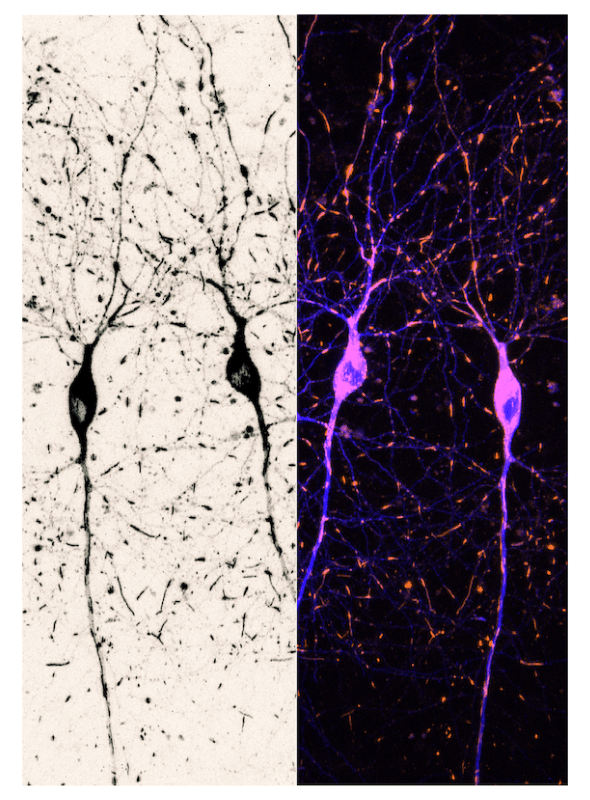On neurons, lifelong learning, meditation, humility, “empty brain calories” and more
 Welcome to a new edition of SharpBrains’ e‑newsletter, featuring 12 fascinating neuroscience findings and open questions–and the beautiful image above.
Welcome to a new edition of SharpBrains’ e‑newsletter, featuring 12 fascinating neuroscience findings and open questions–and the beautiful image above.
#1. “With this image I want to illustrate the large advances made in imaging methods over the past century, allowing modern neuroscientists to look at neurons in ways that Cajal could have only dreamed of.” – Silvia Rodriguez-Rozada, Center for Molecular Neurobiology, Hamburg. Award-winning image shows neuroimaging progress in a century
#2. One more reason why lifelong learning matters: Study: High Cognitive Reserve (CR) seen to significantly lower dementia risk even in the presence of high Alzheimer’s Disease (AD) neuropathology
#3. It’s Friday; perfect time to make some fun and healthy weekend plans: How feeling awe in nature can spur mental well-being and personal growth
#4. Not a bad idea either: On cutting “empty brain calories” by reading a book instead of social media
#5. “…humility helps people let go of defensiveness, take in information that challenges their political views, and see the humanity in people on the other side of the political spectrum. Though it’s not always easy to embrace—especially for those who wrongfully equate it with weakness or a lack of conviction—humility may be what we desperately need right now in the United States.” On perception, cognitive bias and cultivating humility ahead of next week’s vote
#6. “When it feels like the world is crashing down around them, giving young people a moment to feel, express, and receive gratitude can help—and that in itself is something to be grateful for.” Study: A combined teaching + app gratitude program helps adolescents address anxiety and improve mental health
#7. To honor ADHD Awareness Month, let’s address this most important question: What should come first to treat ADHD in children, behavior therapy or stimulant medication?
#8. Debate: Can mindfulness and meditation be harmful? Two new studies answer the question in apparently opposite but actually quite complementary ways.
#10. “…new study funded by the National Institutes of Health that aims to recruit 30,000 volunteers to participate in a memory training study that compares multiple approaches to train working memory”: Given cognitive strengths and needs are diverse, what brain training may work best for each person and under which conditions?
#11. “Virtual reality is a promising skills-based behavioral medicine that has been shown to have high patient engagement and satisfaction,” said Beth Darnall, PhD, AppliedVR’s chief science advisor. “However, chronic pain patients to date have had very limited access to it, so we’re excited to continue working with the FDA to develop our platform and get it into the market faster.” The FDA clears AppliedVR headset to help treat fibromyalgia and chronic pain
#12. “Having run a media company in a tough market with a young, millennial workforce, we witnessed first-hand how there was a complete lack of investment in helping this generation with their mental health in a way that they’re used to: a community product that is mobile-first and video-led. We want to make the world a happier place by making working on your mental health as normal as going to the gym.” — Adnan Ebrahim, co-founder and CEO of MindLabs. What will the ‘Peloton for mental health’ look like five years from now? And, who will develop it?
Wishing you a safe and healthy November,
Alvaro Fernandez and the SharpBrains Team


